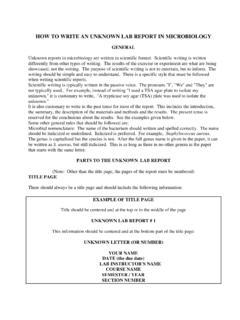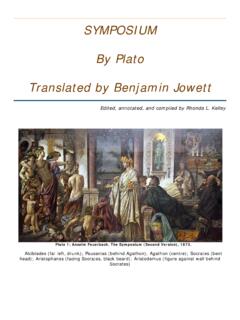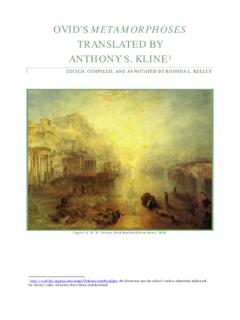Transcription of Ovid: Ars Amatoria (The Art of Love) Trans. by A .S. Kline
1 Ovid: Ars Amatoria (The Art of Love) Trans. by A .S. Kline Introduction1 Figure 1: Eug ne Delacroix, Ovid among the Scythians, 1862 Ovid, the Latin poet of the Roman Empire, was banished in 8 CE from Rome to Tomis (in modern day Romania) by the exclusive intervention of the Emperor Augustus, without any participation of the Senate or of any Roman judge. The reasons for his banishment are not known. At the time, Tomis was a remote town on the edge of the civilized world. According to Ovid, none of its citizens spoke Latin, which as an educated Roman he found trying. Ovid 1 Wikipedia contributors.
2 "Exile of Ovid." Wikipedia, The Free Encyclopedia. Wikipedia, The Free Encyclopedia, 11 Feb. 2014. Web. 23 Apr. 2014. [edited by RKH] wrote that the cause of his own exile was carmen et error (a poem and a mistake). The poem was presumably the Ars Amatoria (The Art of Love). Ovid was one of the most prolific poets of his time, and before being banished had already composed his most famous poems Heroides, Amores, Ars Amatoria , Remedia Amoris, Medicamina Faciei Femineae, his lost tragedy Medea, the ambitious Metamorphoses, and the Fasti. In exile, the poet continued producing works, and wrote some more that survive today: Ibis, Tristia, Epistulae ex Ponto, and possibly several other, minor poems.
3 These works contain letters to friends and enemies, and also depict the poet's treatment by the Scythians particularly Getae, a nomadic people. In 8 CE, the year of the exile, Ovid was 50 years old and it's believed that he enjoyed a great fame in Rome the generation of Virgil (19 BCE) and Horace (8 BCE) having ended, some scholars write that he was then the most famous poet in the city. Book I Part I: His Task Figure 2: Titian, Venus and Cupid, 1550 Should anyone here not know the art of love, read this, and learn by reading how to love. By art the boat s set gliding, with oar and sail, by art the chariot s swift: love s ruled by art.
4 Automedon was skilled with Achilles' chariot reins, Tiphys in Thessaly was steersman of the Argo, Venus appointed me as guide to gentle Love: I ll be known as Love s Tiphys, and Automedon. It s true Love s wild, and one who often flouts me: but he s a child of tender years, fit to be ruled. Chiron made the young Achilles perfect at the lyre, and tempered his wild spirits through peaceful art. He, who so terrified his enemies and friends, they say he greatly feared the aged Centaur. That hand that Hector was destined to know, was held out, at his master s orders, to be flogged.
5 I am Love s teacher as Chiron was Achilles', both wild boys, both children of a goddess. Yet the bullock s neck is bowed beneath the yoke, and the spirited horse s teeth worn by the bit. And Love will yield to me, though with his bow he wounds my heart, shakes at me his burning torch. The more he pierces me, the more violently he burns me, so much the fitter am I to avenge the wounds. Nor will I falsely say you gave me the art, Apollo, no voice from a heavenly bird gives me advice, I never caught sight of Clio or Clio s sisters while herding the flocks, Ascra, in your valleys: Experience prompts this work: listen to the expert poet: I sing true: Venus, help my venture!
6 Far away from here, you badges of modesty, the thin headband, the ankle-covering dress. I sing of safe love, permissible intrigue, and there ll be nothing sinful in my song. Now the first task for you who come as a raw recruit is to find out who you might wish to love. The next task is to make sure that she likes you: the third, to see to it that the love will last. That s my aim, that s the ground my chariot will cover: that s the post my thundering wheels will scrape. Book I Part II: How to Find Her Figure 3: John Leech, The Comic History of Rome: The Mother of the Gracchi, 1850 While you re still free, and can roam on a loose rein, pick one to whom you could say: You alone please me.
7 She won t come falling for you out of thin air: the right girl has to be searched for: use your eyes. The hunter knows where to spread nets for the stag, he knows what valleys hide the angry boar: the wild-fowler knows the woods: the fisherman knows the waters where the most fish spawn: You too, who search for the essence of lasting love, must be taught the places that the girls frequent. I don t demand you set your sails, and search, or wear out some long road to discover them. Perseus brought Andromeda from darkest India, and Trojan Paris snatched his girl from Greece, Rome will grant you lots of such lovely girls, you ll say: Here s everything the world has had.
8 Your Rome s as many girls as Gargara s sheaves, as Methymna s grapes, as fishes in the sea, as birds in the hidden branches, stars in the sky: Venus, Aeneas s mother, haunts his city. If you d catch them very young and not yet grown, real child-brides will come before your eyes: if it s young girls you want, thousands will please you. You ll be forced to be unsure of your desires: if you delight greatly in older wiser years, here too, believe me, there s an even greater crowd. Book I Part IX: How To Win Her Figure 4: Pleading, Sir Lawrence Alma-Tadema, 1876 So far, riding her unequal wheels, the Muse has taught you where you might choose your love, where to set your nets.
9 Now I ll undertake to tell you what pleases her, by what arts she s caught, itself a work of highest art. Whoever you are, lovers everywhere, attend, with humble minds, and you, masses, show you support me: use your thumbs. First let faith enter into your mind: every one of them can be won: you ll win her, if you only set your snares. Birds will sooner be silent in the Spring, cicadas in summer, an Arcadian hound turn his back on a hare, than a woman refuse a young man s flattering words: Even she you might think dislikes it, will like it. Secret love s just as pleasing to women as men.
10 Men pretend badly: she hides her desire. If it was proper for men not to be the first to ask, woman s role would be to take the part of the asker. The cow lows to the bull in gentle pastures: the mare whinnies to the hoofed stallion. Desire in us is milder and less frantic: the male fire has its lawful limits. Remember Byblis, who burned with incestuous love, for her brother, and bravely punished herself with the noose? Myrrha loved her father, but not as a daughter should, and then was hidden by the covering bark: oozing those tears, that pour from the tree as fragrance, and whose droplets take their name from the girl.












![Wraith ARS 2X Operator's Manual [1.2.0]](/cache/preview/3/c/8/d/7/e/8/6/thumb-3c8d7e866e7dfafc4d1cbc9d78ad6a56.jpg)




